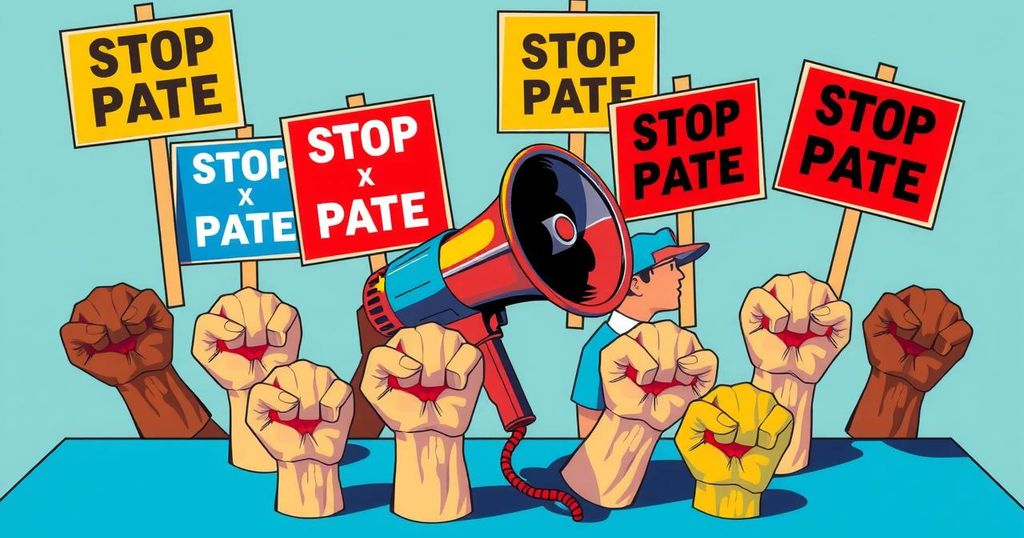World news
AFRICA, APPIAH, APPIAH STADIUM, ART OF POLITICAL THEATRE APPIAH STADIUM, BABA YARA, BABA YARA SPORTS STADIUM, BURMA, BURMA CAMP, DEMOCRACY, FRANK KWAKU APPIAH, GHANA, GOVERNANCE, JOHN MAHAMA, KUFUOR, KUMASI, LEADERSHIP, MAHAMA, NATIONAL DEMOCRATIC CONGRESS, NDC, NEW PATRIOTIC PARTY, NPP, POLITICS
Fatima Khan
0 Comments
Exploring the Political Journey of Appiah Stadium: Activism and Controversy in Ghanaian Politics
Frank Kwaku Appiah, or “Appiah Stadium,” is a controversial political figure in Ghana, noted for his impactful presence at state events and affiliation with the NDC. His political evolution from NPP support to NDC advocacy reveals a strategic adaptation to Ghana’s political culture. Appiah employs theatrical tactics for visibility, embodying grassroots aspirations and navigating cultural norms, thus solidifying his relevance in Ghanaian politics.
Frank Kwaku Appiah, known as “Appiah Stadium,” has become a controversial icon in Ghanaian politics due to his provocative presence at state events. As a self-styled activist and ardent supporter of the National Democratic Congress (NDC), his journey from a security guard to a significant political player illustrates his ambition and strategic adaptability within Ghana’s political landscape.
Initially, Appiah Stadium began his political career as a vocal supporter of the New Patriotic Party (NPP) during the late 2000s. His loyalty waned after a violent incident in 2009, where he survived an attack by NDC youth, leading to a shift in allegiance to the NDC, where he leveraged his oratory skills to emerge as a prominent figure. This trajectory highlights the flexibility often seen among grassroots activists in Ghana’s political sphere, where survival and opportunity frequently supersede steadfast loyalty.
Appiah Stadium’s approach to politics is characterized by his flair for theatricality. His disruptive tactics, including attempts to approach President John Mahama at public events, exemplify his keen understanding of the media’s role, driving coverage and maintaining his visibility. During Mahama’s funeral in February 2025, Appiah’s efforts to corner the president garnered headlines, underscoring his strategic maneuvering within Ghana’s media environment.
His controversial nature often leads to significant backlash, such as his 2017 arrest for alleging that President Nana Akufo-Addo used marijuana, a claim that resonated throughout the nation. The subsequent dropped charges and public apology allowed Appiah Stadium to reframe himself as a victim of political repression, further bolstering his appeal within the NDC.
Critics contend that Appiah’s antics are tolerated by political elites due to his loyalty to the NDC and his representation of grassroots sentiments. He openly expresses his aspirations for political appointments, reflecting the transactional relationships within Ghana’s political patronage system. His presence at official events communicates to supporters that the party values its activists, which is vital during election periods.
Appiah Stadium also adeptly interacts with Ghana’s cultural milieu. His appearance at the 2025 Akwasidae Kese festival, dressed in traditional Kente cloth, exemplifies respect for cultural practices, allowing him to blend his turbulent political persona with cultural credence. This duality helps mitigate claims against him as a mere provocateur by portraying him as a person who embodies Ghanaian values.
Appiah Stadium’s persistence in Ghanaian politics can be attributed to his proficiency in media manipulation, representation of grassroots desires for political patronage, and adept navigation of cultural realms. His controversial methods, while provoking criticism, reflect Ghana’s democratic realities where visibility is often equated with relevance. To the NDC, he functions as a flawed yet valuable tool; to detractors, he symbolizes disruptive political performance. As long as audacity and spectacle hold value in Ghanaian politics, Appiah Stadium is likely to remain a significant and persistent figure.
In summary, Frank Kwaku Appiah, or Appiah Stadium, exemplifies a complex figure within Ghanaian politics, navigating shifts in allegiance while capitalizing on media spectacle and cultural norms. His journey from NPP supporter to NDC advocate illustrates the adaptable nature of grassroots activists in Ghana. Despite his paradoxical methods, his endurance in the political realm highlights both his role as a voice for grassroots aspirations and a representation of the intricate dynamics of power tolerance in the country’s democracy.
Original Source: 3news.com




Post Comment